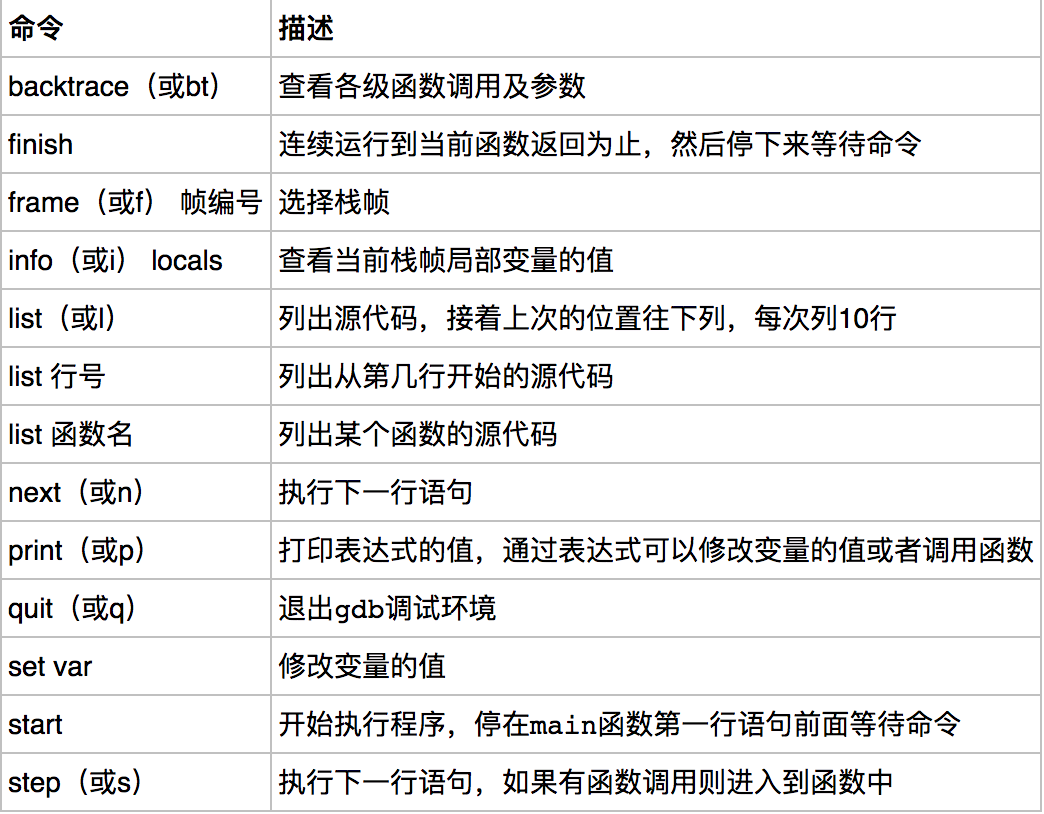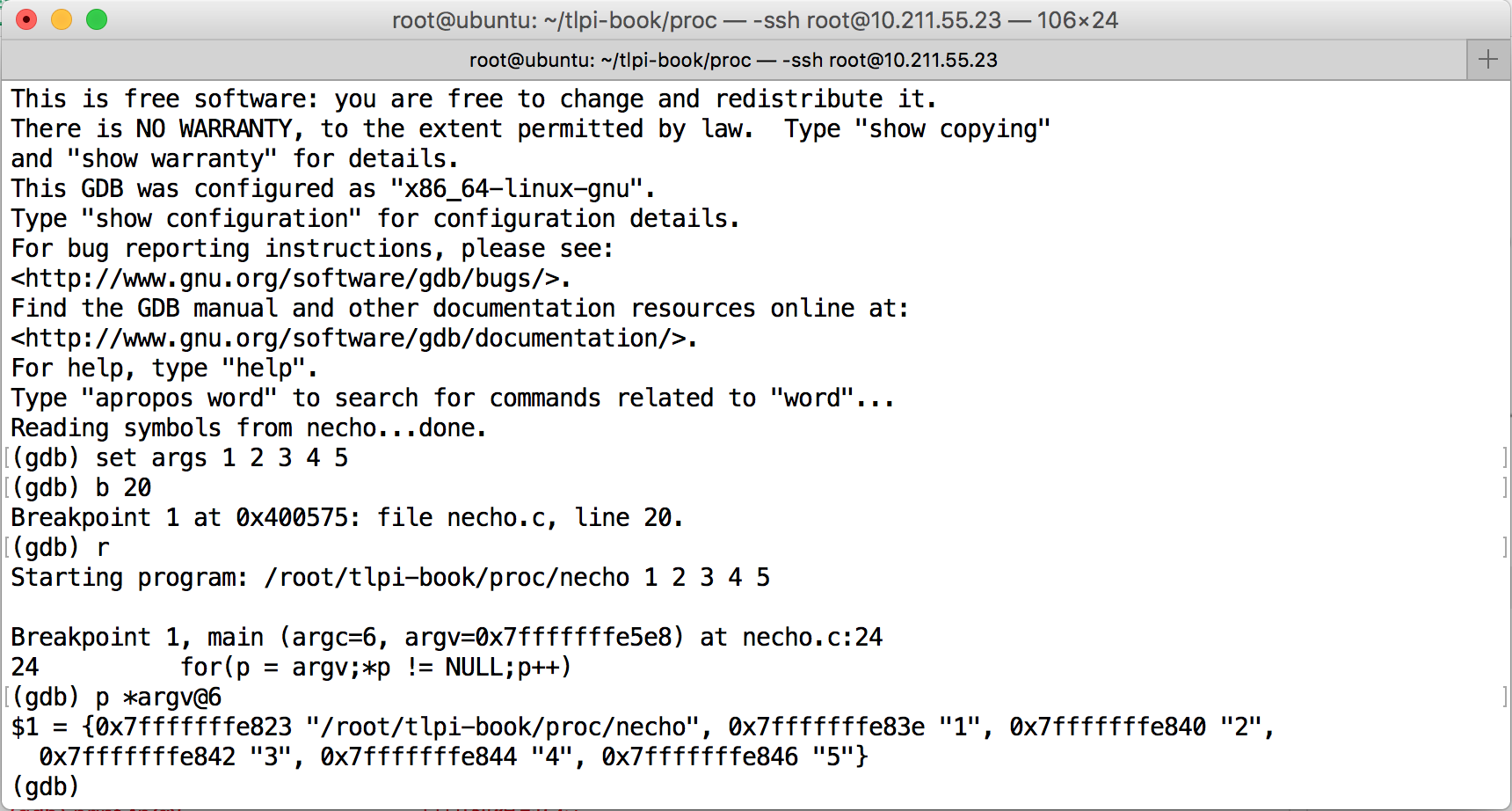文章转载自coolshell.cn,对相关内容根据自己理解有改动,原文请访问作者博客.
GDB是GNU开源组织发布的一个强大的UNIX下的程序调试工具。或许,各位比较喜欢那种图形界面方式的,像VC、BCB等IDE的调试,但如果你是在UNIX平台下做软件,你会发现GDB这个调试工具有比VC、BCB的图形化调试器更强大的功能。所谓“寸有所长,尺有所短”就是这个道理。
一般来说,GDB主要帮忙你完成下面四个方面的功能:
1、启动你的程序,可以按照你的自定义的要求随心所欲的运行程序。
2、可让被调试的程序在你所指定的调置的断点处停住。(断点可以是条件表达式)
3、当程序被停住时,可以检查此时你的程序中所发生的事。
4、动态的改变你程序的执行环境。
从上面看来,GDB和一般的调试工具没有什么两样,基本上也是完成这些功能,不过在细节上,你会发现GDB这个调试工具的强大,大家可能比较习惯了图形化的调试工具,但有时候,命令行的调试工具却有着图形化工具所不能完成的功能。让我们一一看来。
一个调试示例
——————
源程序:tst.c
#include <stdio.h>
int func(int n)
{
int sum=0,i;
for(i=0; i<n; i++)
{
sum+=i;
}
return sum;
}
int main()
{
int i;
long result = 0;
for(i=1; i<=100; i++)
{
result += i;
}
printf("result[1-100] = %d /n", result );
printf("result[1-250] = %d /n", func(250) );
}
编译生成执行文件:(Linux下)
[root@centos-linux ~]#gcc -g tst.c -o tst
使用GDB调试:
[root@centos-linux ~]#gdb tst <---------- 启动GDB
GNU gdb 5.1.1
Copyright 2002 Free Software Foundation, Inc.
GDB is free software, covered by the GNU General Public License, and you are
welcome to change it and/or distribute copies of it under certain conditions.
Type "show copying" to see the conditions.
There is absolutely no warranty for GDB. Type "show warranty" for details.
This GDB was configured as "i386-suse-linux"...
(gdb) l <-------------------- l命令相当于list,从第一行开始例出原码。
1 #include
3 int func(int n)
4 {
5 int sum=0,i;
6 for(i=0; i<n; i++)
7 {
8 sum+=i;
9 }
10 return sum;
(gdb) <-------------------- 直接回车表示,重复上一次命令
11 }
12
13
14 main()
15 {
16 int i;
17 long result = 0;
18 for(i=1; i<=100; i++)
19 {
20 result += i;
(gdb) break 16 <-------------------- 设置断点,在源程序第16行处。
Breakpoint 1 at 0x8048496: file tst.c, line 16.
(gdb) break func <-------------------- 设置断点,在函数func()入口处。
Breakpoint 2 at 0x8048456: file tst.c, line 5.
(gdb) info break <-------------------- 查看断点信息。
Num Type Disp Enb Address What
1 breakpoint keep y 0x08048496 in main at tst.c:16
2 breakpoint keep y 0x08048456 in func at tst.c:5
(gdb) r <--------------------- 运行程序,run命令简写
Starting program: /home/hchen/test/tst
Breakpoint 1, main () at tst.c:17 <---------- 在断点处停住。
17 long result = 0;
(gdb) n <--------------------- 单条语句执行,next命令简写。
18 for(i=1; i<=100; i++)
(gdb) n
20 result += i;
(gdb) n
18 for(i=1; i<=100; i++)
(gdb) n
20 result += i;
(gdb) c <--------------------- 继续运行程序,continue命令简写。
Continuing.
result[1-100] = 5050 <----------程序输出。
Breakpoint 2, func (n=250) at tst.c:5
5 int sum=0,i;
(gdb) n
6 for(i=1; i<=n; i++)
(gdb) p i <--------------------- 打印变量i的值,print命令简写。
$1 = 134513808
(gdb) n
8 sum+=i;
(gdb) n
6 for(i=1; i<=n; i++)
(gdb) p sum
$2 = 1
(gdb) n
8 sum+=i;
(gdb) p i
$3 = 2
(gdb) n
6 for(i=1; i<=n; i++)
(gdb) p sum
$4 = 3
(gdb) bt <--------------------- 查看函数堆栈。
0 func (n=250) at tst.c:5
1 0x080484e4 in main () at tst.c:24
2 0x400409ed in __libc_start_main () from /lib/libc.so.6
(gdb) finish <--------------------- 退出函数。
Run till exit from #0 func (n=250) at tst.c:5
0x080484e4 in main () at tst.c:24
24 printf("result[1-250] = %d /n", func(250) );
Value returned is $6 = 31375
(gdb) c <--------------------- 继续运行。
Continuing.
result[1-250] = 31375 <----------程序输出。
Program exited with code 027. <--------程序退出,调试结束。
(gdb) q <--------------------- 退出gdb。
hchen/test>
好了,有了以上的感性认识,还是让我们来系统地认识一下gdb吧。
使用GDB
————
一般来说GDB主要调试的是C/C++的程序。要调试C/C++的程序,首先在编译时,我们必须要把调试信息加到可执行文件中。使用编译器(cc/gcc/g++)的 -g 参数可以做到这一点。如:
> gcc -g hello.c -o hello如果没有-g,你将看不见程序的函数名、变量名,所代替的全是运行时的内存地址。当你用-g把调试信息加入之后,并成功编译目标代码以后,让我们来看看如何用gdb来调试他。
启动GDB的方法有以下几种:
1、gdb <program>
program也就是你的执行文件,一般在当然目录下。
2、gdb <program> core
用gdb同时调试一个运行程序和core文件,core是程序非法执行后core dump后产生的文件。
3、gdb <program> <PID>
如果你的程序是一个服务程序,那么你可以指定这个服务程序运行时的进程ID。gdb会自动attach上去,并调试他。program应该在PATH环境变量中搜索得到。
GDB启动时,可以加上一些GDB的启动开关,详细的开关可以用gdb -help查看。我在下面只例举一些比较常用的参数:
-symbols
-se file
从指定文件中读取符号表信息,并把他用在可执行文件中。
-core
-directory
gdb调试带命令行参数
gdb 可执行文件名
set args 命令行参数1 命令行参数2 命令行参数3 命令行参数4 命令行参数5
演示如下所示:
p *argv@6 打印包含程序名在内的所有内容.
也可以在gdb中,通过命令来设置,例如:
(gdb) set args a b c
(gdb) show args
Argument list to give program being debugged when it is started is "a b c".
也可以在运行程序时,直接指定:
(gdb) r a b
Starting program: /home/xmj/tmp/a.out a b
(gdb) show args
Argument list to give program being debugged when it is started is "a b".
(gdb) r
Starting program: /home/xmj/tmp/a.out a b
可以看出,参数已经被保存了,下次运行时直接运行run命令,即可。
使用如下命令清空参数:
(gdb) set args

